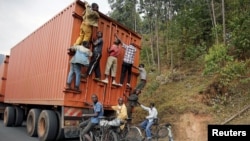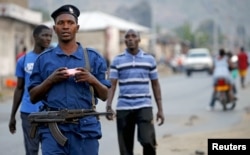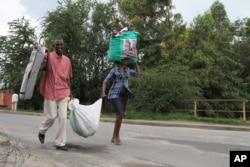Political violence, a shrinking economy and biting aid cuts are worsening poverty and hunger across Burundi, amid reports that thousands of people are internally displaced and unable to get help.
People are fleeing their homes in one of the world's poorest and hungriest countries, amid United Nations warnings that mass atrocities could erupt following inflammatory remarks by government officials.
Many displaced people are scared of being identified, fearing their lives are in danger for supporting, or being perceived to support, the political opposition, Refugees International said Wednesday.
"They fled after multiple threats, arrests, torture and even the rape of female family members – actions allegedly carried out by different security actors," it said in a report.
Burundian government agents have beaten, arrested or turned back suspected pro-opposition citizens at the border, it added.
The presidential spokesman was not immediately available to comment.
At least 240 people have been killed and over 200,000 have fled to neighboring states during months of violence that began when President Pierre Nkurunziza decided in April to run for a third term. He won a disputed election in July.
There have been violent clashes between protesters and security forces in the capital, Bujumbura, and a series of targeted killings. Corpses are regularly found in the streets after nightly gunfire.
Increases in food insecurity, disease
In the first assessment of its kind since the crisis began, the International Organization of Migration (IOM) identified almost 15,000 displaced people living in Makamba and Kirundo border provinces.
Six out of 10 of those surveyed were children and 85 percent of the displaced said they did not have enough to eat, IOM's Burundi country director Kristina Mejo told the Thomson Reuters Foundation.
Many children had malaria, malnutrition and diarrhea, the survey found.
The IOM hopes to carry out assessments in other provinces, to identify people's needs and provide goods such as cooking pots, plastic sheeting and blankets, Mejo said.
Children are bearing the brunt of Burundi's political turmoil, agencies said, as rising prices and falling incomes in the tiny central African country make buying food a struggle.
"We are seeing increases in food insecurity as well as higher rates of malnutrition," said Richard Crothers, the International Rescue Committee's country director.
Repeated migrations, increasing household poverty and poor harvests have contributed to unusually high mid-year malnutrition rates, reaching 8 percent among displaced children, according to the U.N. children's fund (UNICEF).
"The potential impact of the current crisis and an economic downturn on children cannot be underestimated," Unicef spokesman James Elder said. "It could be devastating."
Drop in aid, salaries adds to pain
Four out of five Burundians live on less than $1.25 a day, the World Bank says. Half the budget comes from donors and the government – the largest employer – has difficulty paying salaries because of aid cuts and falling tax revenues.
"Each time a position disappears in a place like Burundi, it impacts 10 to 15 people who have been reliant on that salary," Crothers said.
The European Union, the United States, Belgium and the Netherlands have withheld millions of dollars of aid in an attempt to push Nkurunziza to negotiate with the opposition.
The International Monetary Fund expects the economy to shrink by 7.2 percent this year, reversing a decade of growth since the end of civil war in 2005.
Donors fund 60 percent of the health budget and drugs have run out in many public health centers, forcing people to buy medicine in private pharmacies, Unicef's Elder said.
Donor-funded incentives have been cut, and some medics are starting to charge for once-free services for children under five and pregnant women, Crothers said.







